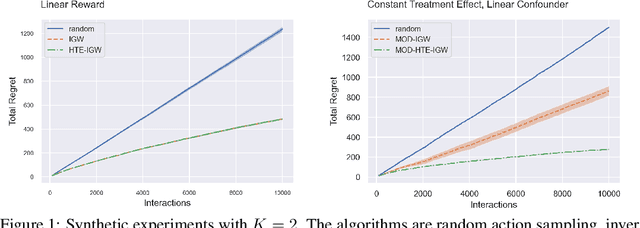Flexible and Efficient Contextual Bandits with Heterogeneous Treatment Effect Oracle
Paper and Code
Mar 30, 2022
Many popular contextual bandit algorithms estimate reward models to inform decision making. However, true rewards can contain action-independent redundancies that are not relevant for decision making and only increase the statistical complexity of accurate estimation. It is sufficient and more data-efficient to estimate the simplest function that explains the reward differences between actions, that is, the heterogeneous treatment effect, commonly understood to be more structured and simpler than the reward. Motivated by this observation, building on recent work on oracle-based algorithms, we design a statistically optimal and computationally efficient algorithm using heterogeneous treatment effect estimation oracles. Our results provide the first universal reduction of contextual bandits to a general-purpose heterogeneous treatment effect estimation method. We show that our approach is more robust to model misspecification than reward estimation methods based on squared error regression oracles. Experimentally, we show the benefits of heterogeneous treatment effect estimation in contextual bandits over reward estimation.
 Add to Chrome
Add to Chrome Add to Firefox
Add to Firefox Add to Edge
Add to Edge